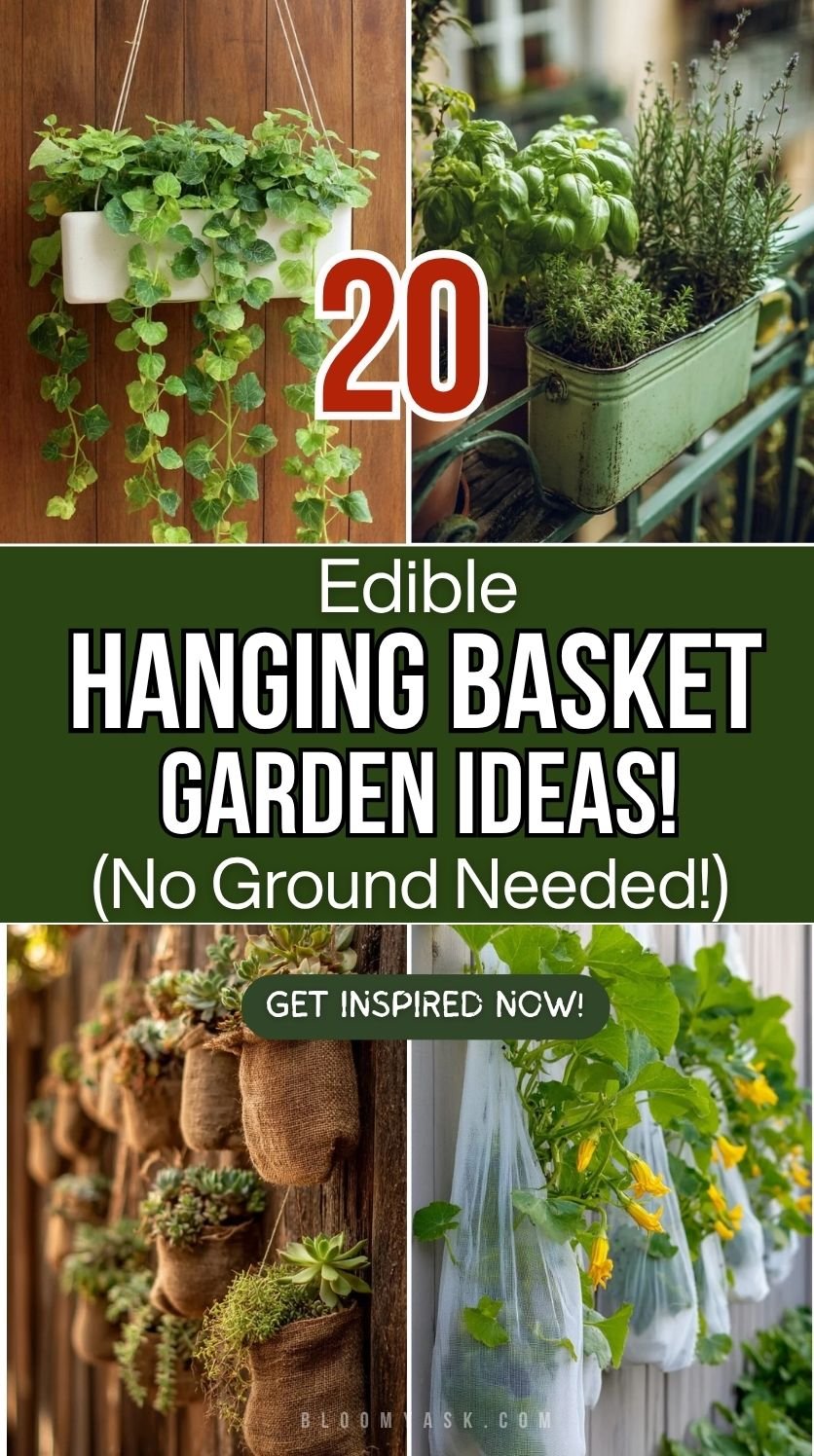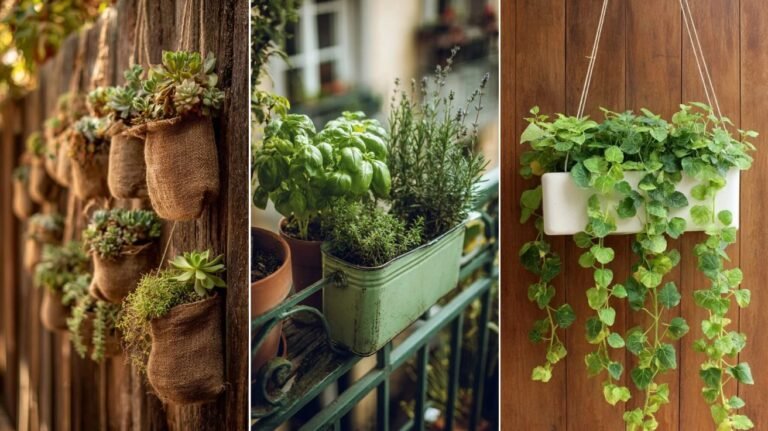Edible hanging gardens aren’t just for those with big yards or perfect patios. They’re made for small spaces, balconies, back porches, anywhere you can hang a hook and dream up a harvest. Herbs, strawberries, lettuce, peppers, even trailing cucumbers, there’s a whole menu of plants that thrive when grown above ground.
And here’s the magic: they’re as beautiful as they are practical. Imagine cascading basil, tumbling nasturtiums, little bursts of red and green that double as both décor and dinner. It’s gardening that doesn’t take itself too seriously, but still delivers the goods.
Ready to grow up, not out? These edible hanging basket garden ideas are full of charm, flavor, and easy ways to turn your vertical space into a living pantry.
1. Drape Nasturtium Vines for Vertical Edible Interest
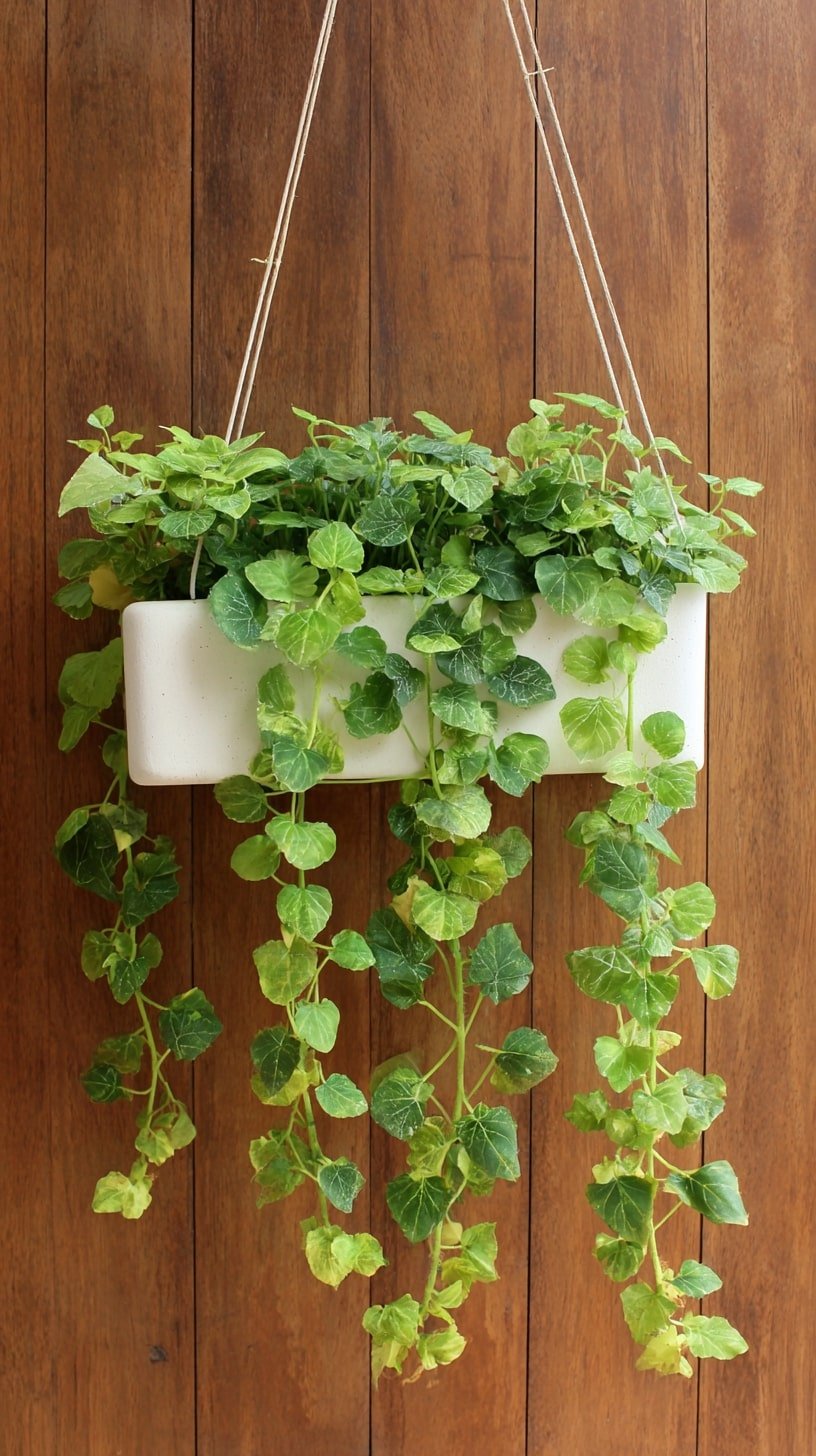
The structure is simple. White trough, twin jute lines, clean wood backdrop. But the impact comes from the plant architecture, nasturtiums tumble in layered strands, each vine spaced enough to breathe but close enough to feel cohesive.
Leaf tones shift from lime to forest, giving depth. Soft edges. Nothing sharp or rigid. It reads soft, edible, intentional.
Great for beginners. Or anyone craving a garden that gives back without shouting for attention.
2. Clip Herbs into a Vintage Rail Planter for Balcony Harvests
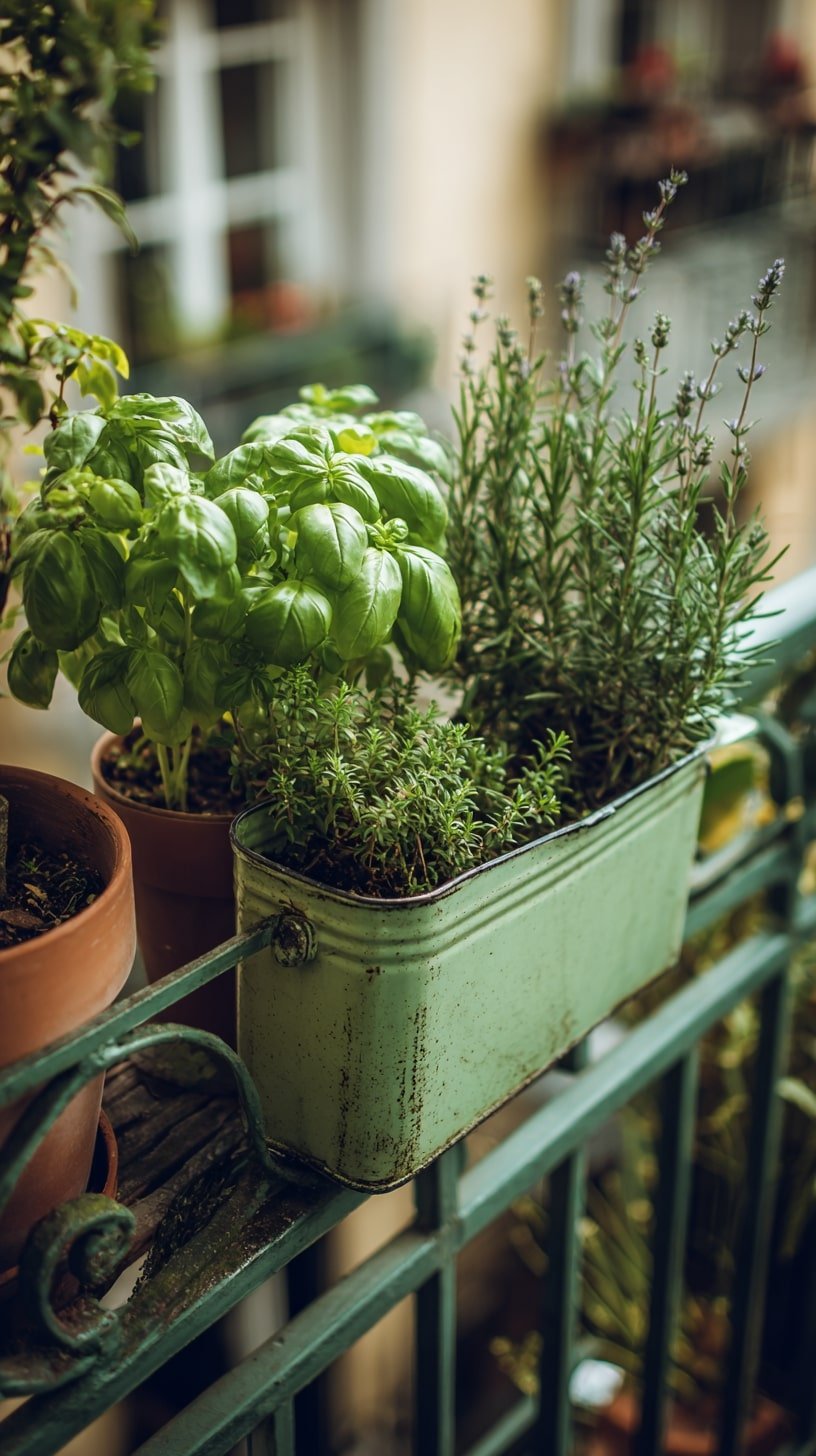
No frills, just flavor. The faded mint planter adds character, weathered but sturdy. Nestled into the rail, it maximizes edge space without clutter. Basil domes in bold green. Rosemary stands tall, like spires.
Thyme fills gaps with texture. Three herbs, one narrow bed. It’s compact, functional, grounded in real use.
Ideal for apartment cooks craving fresh cuttings within arm’s reach.
3. String Burlap Grow Bags for Rustic Vertical Greens
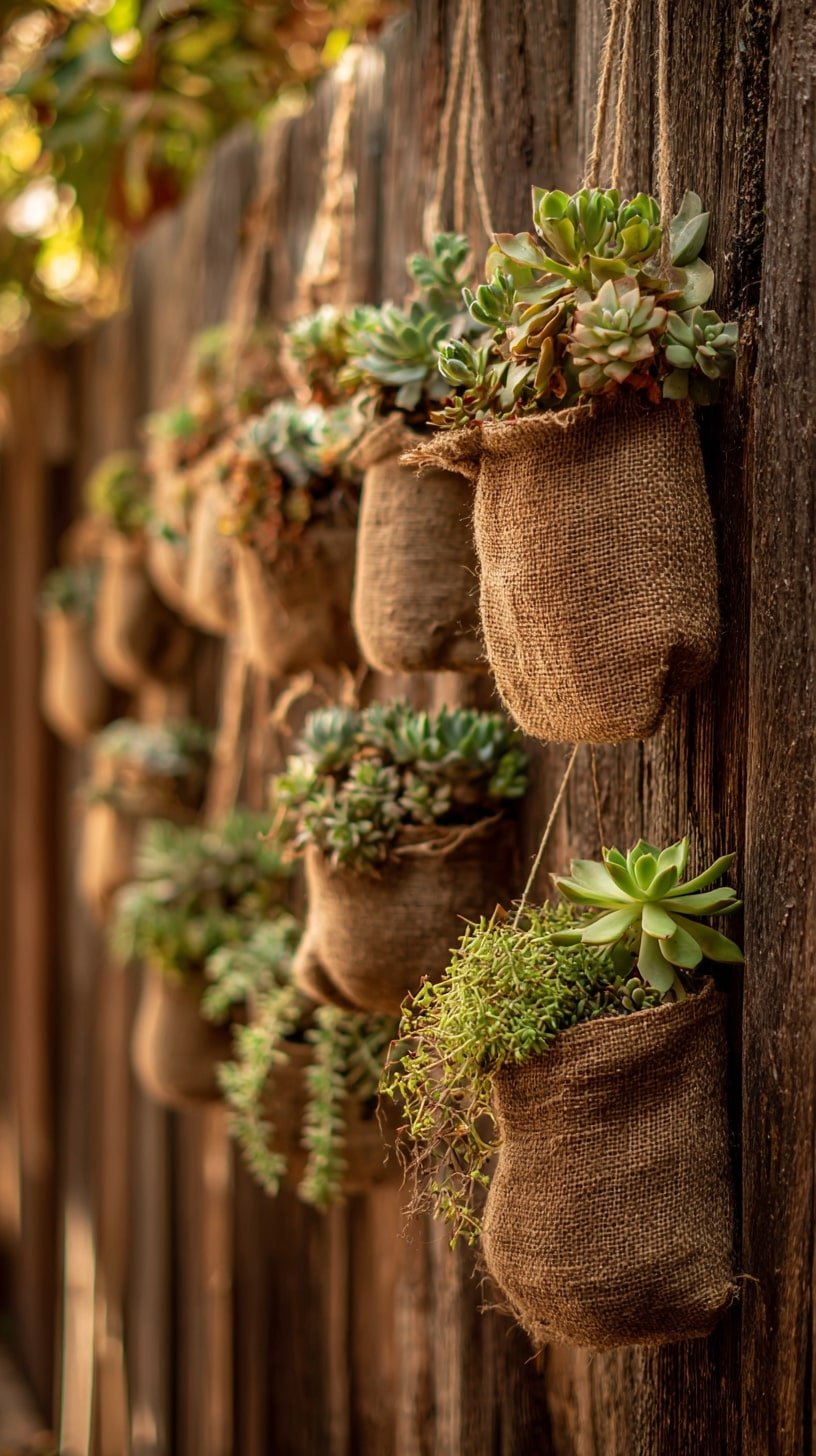
Raw texture meets living color. Burlap sacks line up along weathered wood, suspended by jute ropes that match their coarse grain.
Each pocket holds succulents, but swap them for leafy herbs,oregano, chives, maybe creeping thyme, and you’ve got a wall of snacks.
Breathable, drainable, forgiving. Bags shift softly in breeze.
4. Suspend Mesh Bags for Airy Squash Production
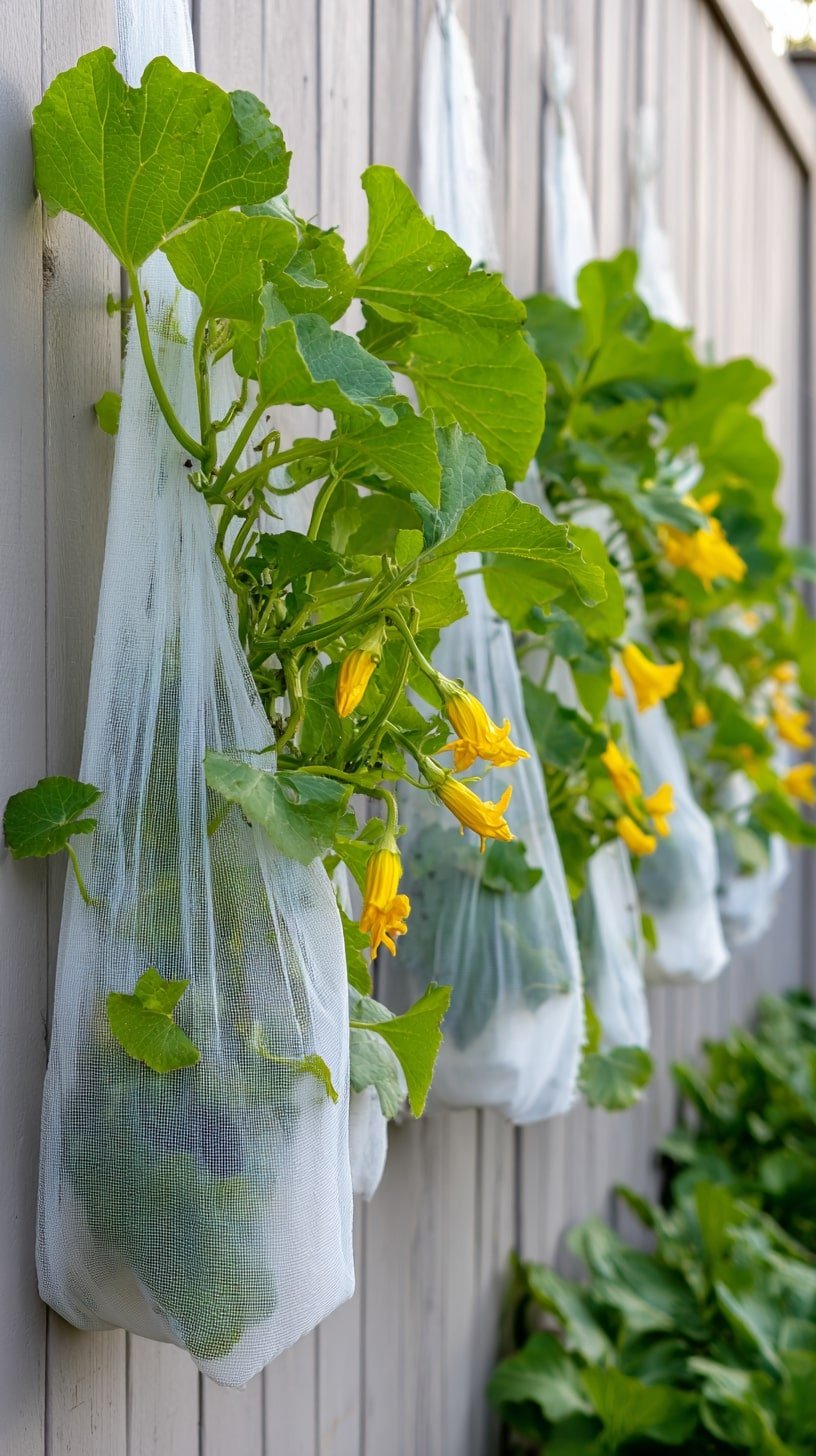
Smart and simple. Nylon mesh hugs the squash roots while letting air, light, and water move freely. No soggy soil. No mold. Just breathable, flexible grow space.
Yellow blossoms burst out like mini suns, catching light against the cool-toned fence.
Plants tilt outward slightly,by design. That lean gives fruit room to grow without crowding. Great for vertical growers with tight footprints but full-sun ambitions. Practical, light, and quietly brilliant.
6. Mount Canvas Grow Bags to Turn Wall Space into Salad Space
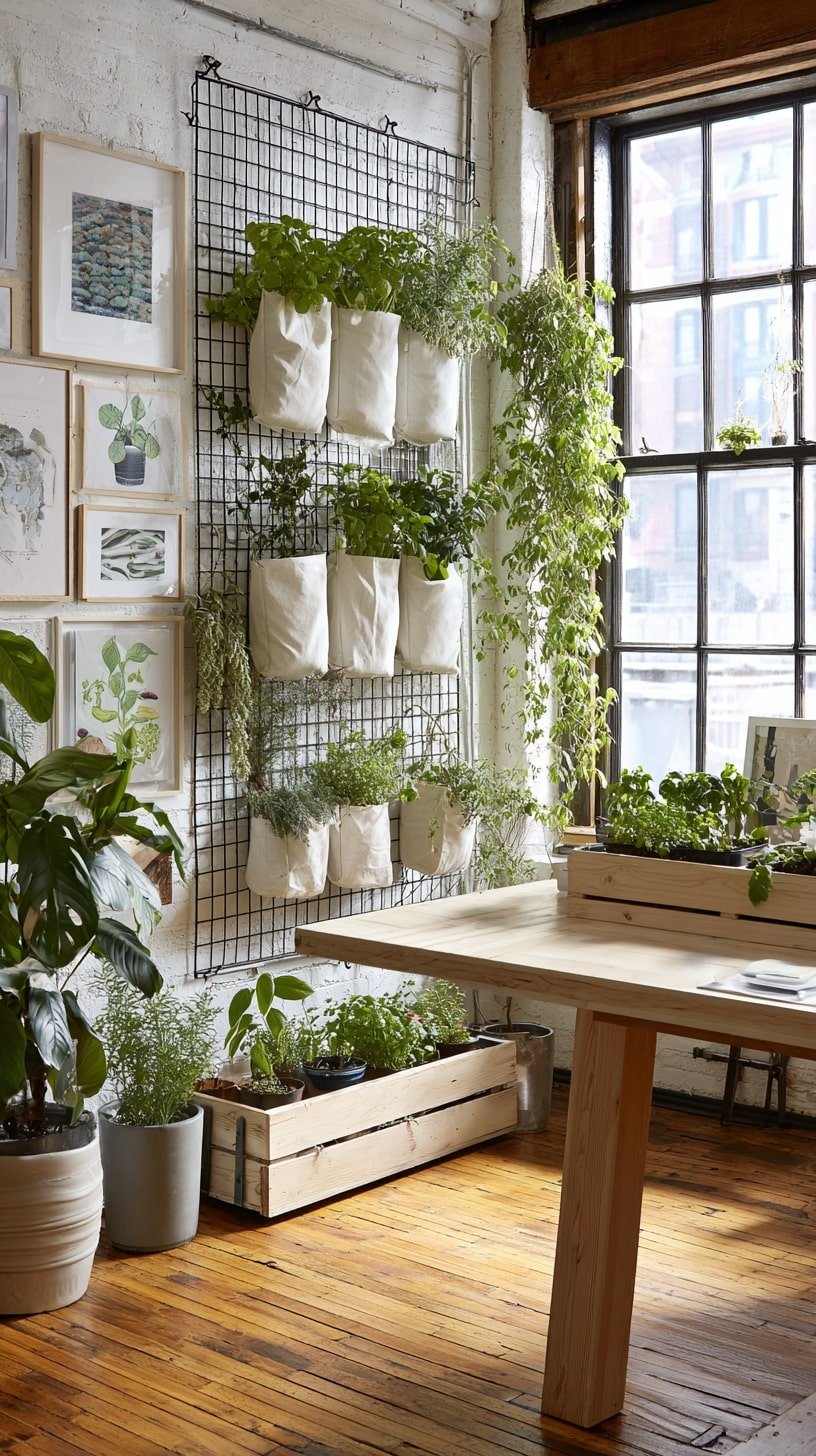
Bright, structured, highly livable. Canvas grow bags hang from a clean black wire grid, forming tidy rows of herbs and greens right by the window.
Bags stay upright, breathable. Nothing slouches. The soft material holds shape while letting excess moisture escape,a smart combo for indoor use.
Big win: sunlight pours in. Plants lean but don’t stretch. Natural wood floor warms the whole scene. Gallery wall softens it further. Feels lived-in, cultivated, not showroom sterile. Great model for renters, creatives, anyone turning walls into harvest.
7. Drape Grow Bags Under Pergola Beams for Sky-High Greens
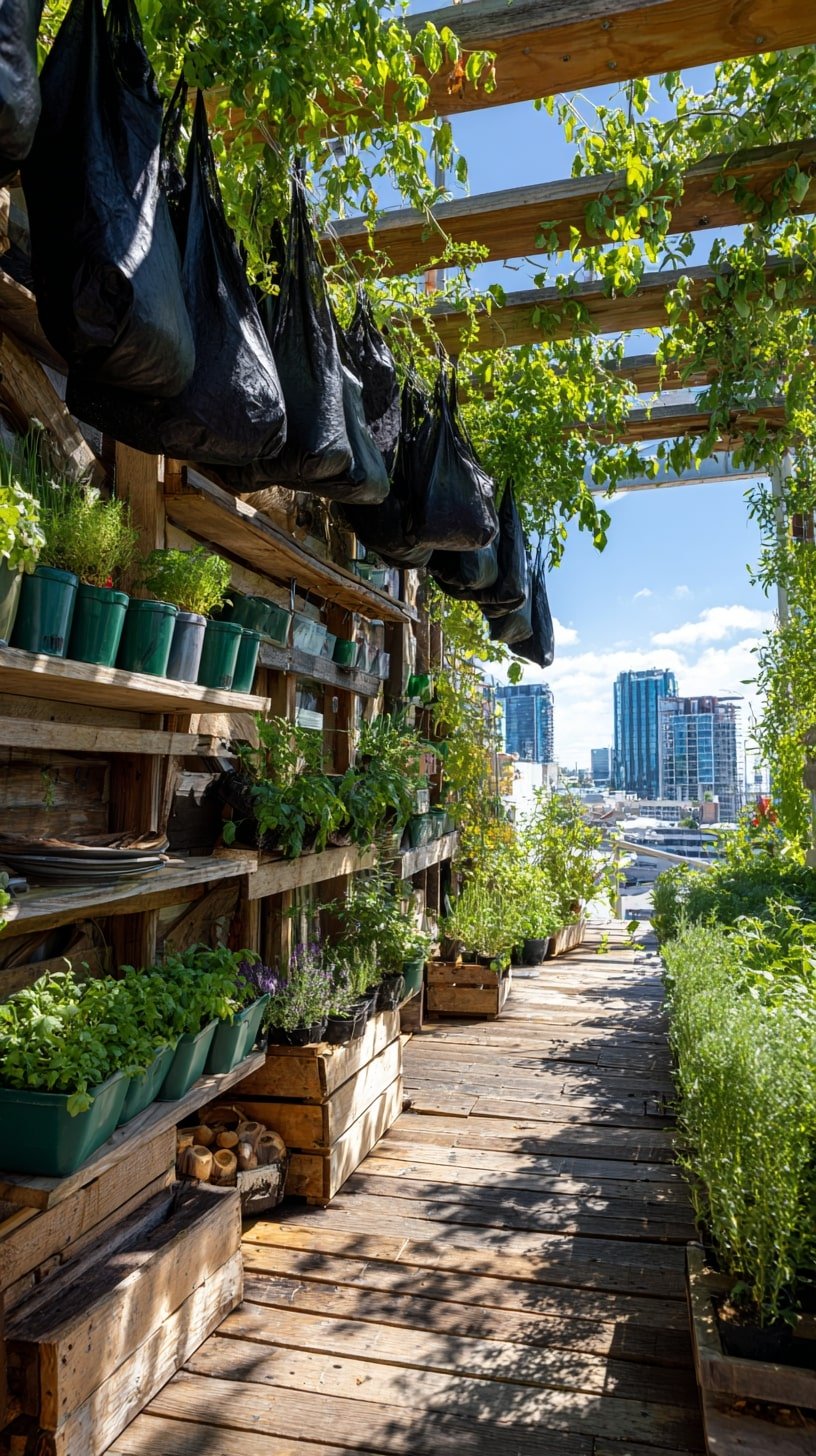
This rooftop setup punches above its weight. Black fabric grow bags hang heavy under sun-soaked slats, their weight balanced by strong ties and steady framing.
Tough, breathable, built for yield. Above, vines curl around beams,green meets sky.
Below, crates and pots layer out from the wall. Tight spacing, no waste. Every inch farms something.
A city gardener’s dream: structured chaos with full sun, strong lines, and nonstop harvest. Feels ambitious, but reachable. Rugged and alive.
8. Stack Clay Pots into Trellis Panels for a Burst of Edible Color
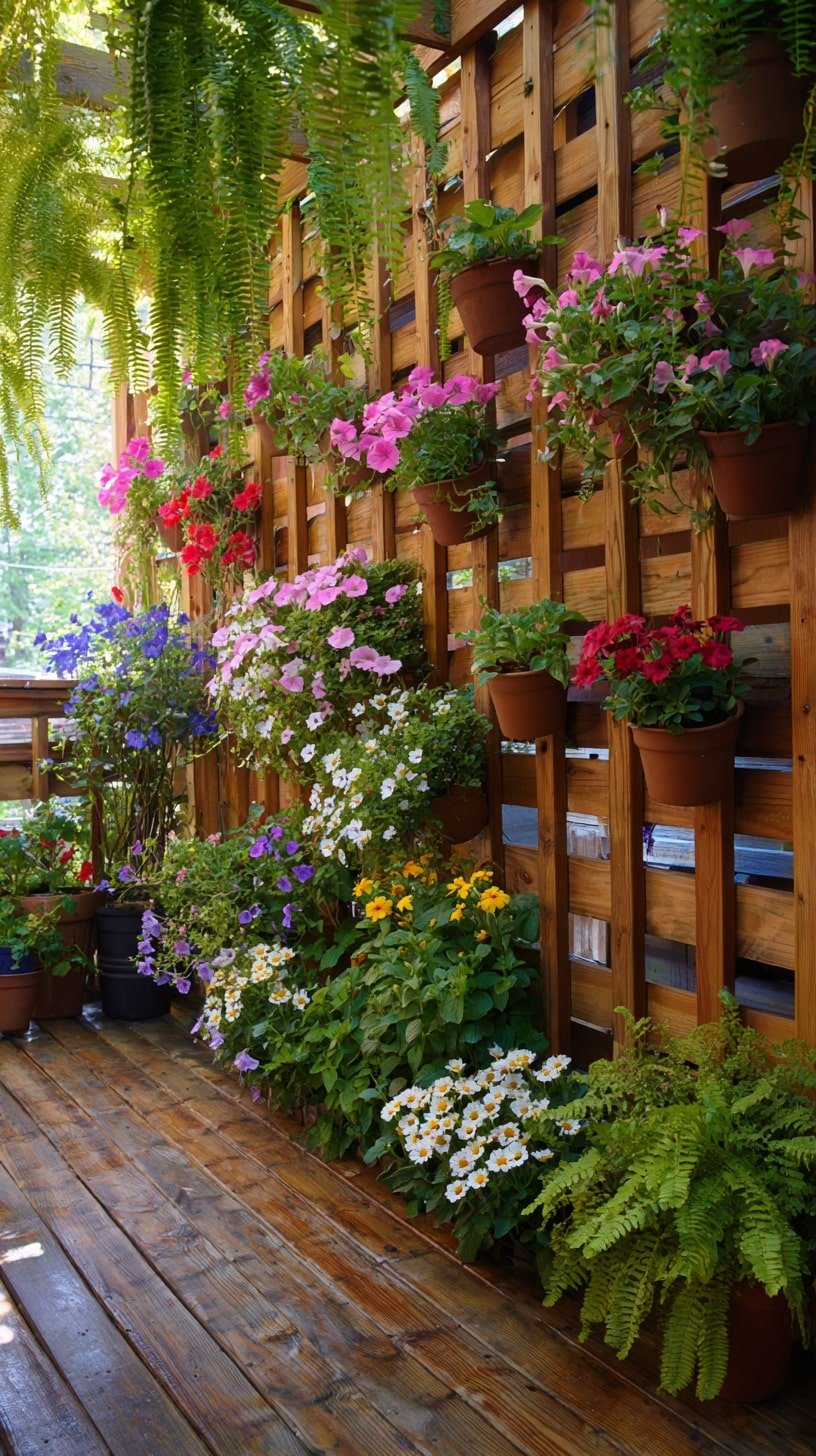
Bold layout. Clay pots lock into a vertical trellis grid, wrapping the whole wall in form and bloom. While this one’s floral, swap in nasturtiums, trailing cherry tomatoes, or mini chard for edible impact.
Pots tilt forward slightly, intentional, to ease drainage and access.
Wood tones keep it grounded. Ferns drop from above, softening structure. Feels alive, curated, generous. A patio that feeds you visually and literally, with just a few swaps.
9.Fill Vertical Planters for a Living Wall of Edible Color
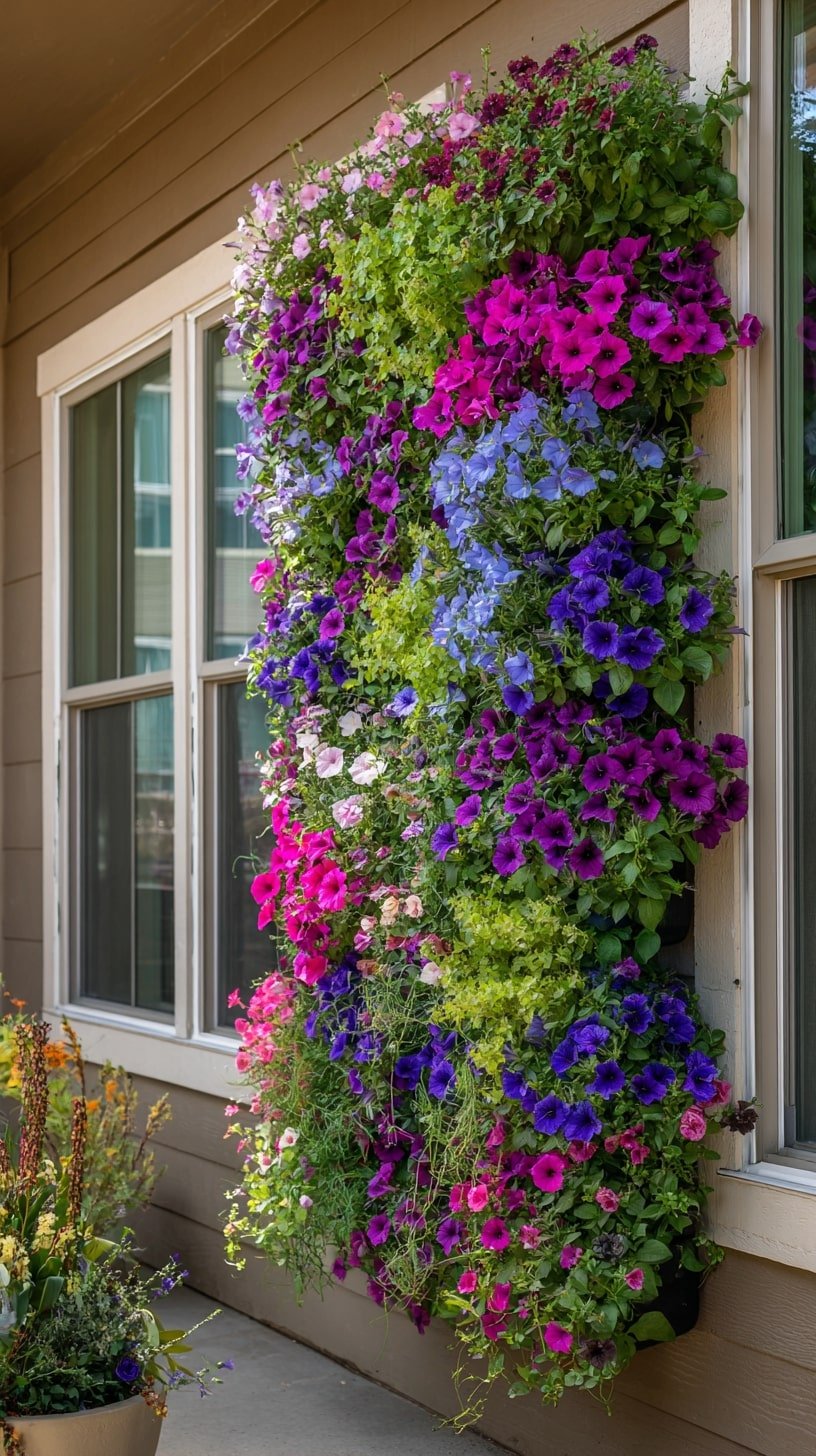
This layout hits hard. A full-frame wall planter, packed tight with petunias and foliage, floods the siding with texture and hue. Now swap half with edible greens,red romaine, purple basil, golden nasturtiums,and you get salad and spectacle in one.
Spacing is clever. Every pocket blooms without smothering neighbors. Color reads rich, not chaotic. A wall that feeds eyes and kitchen. Balanced but wild. Trim weekly, eat daily.
10.Hang Canvas Pockets Under Windows for a Sun-Kissed Herb Rack
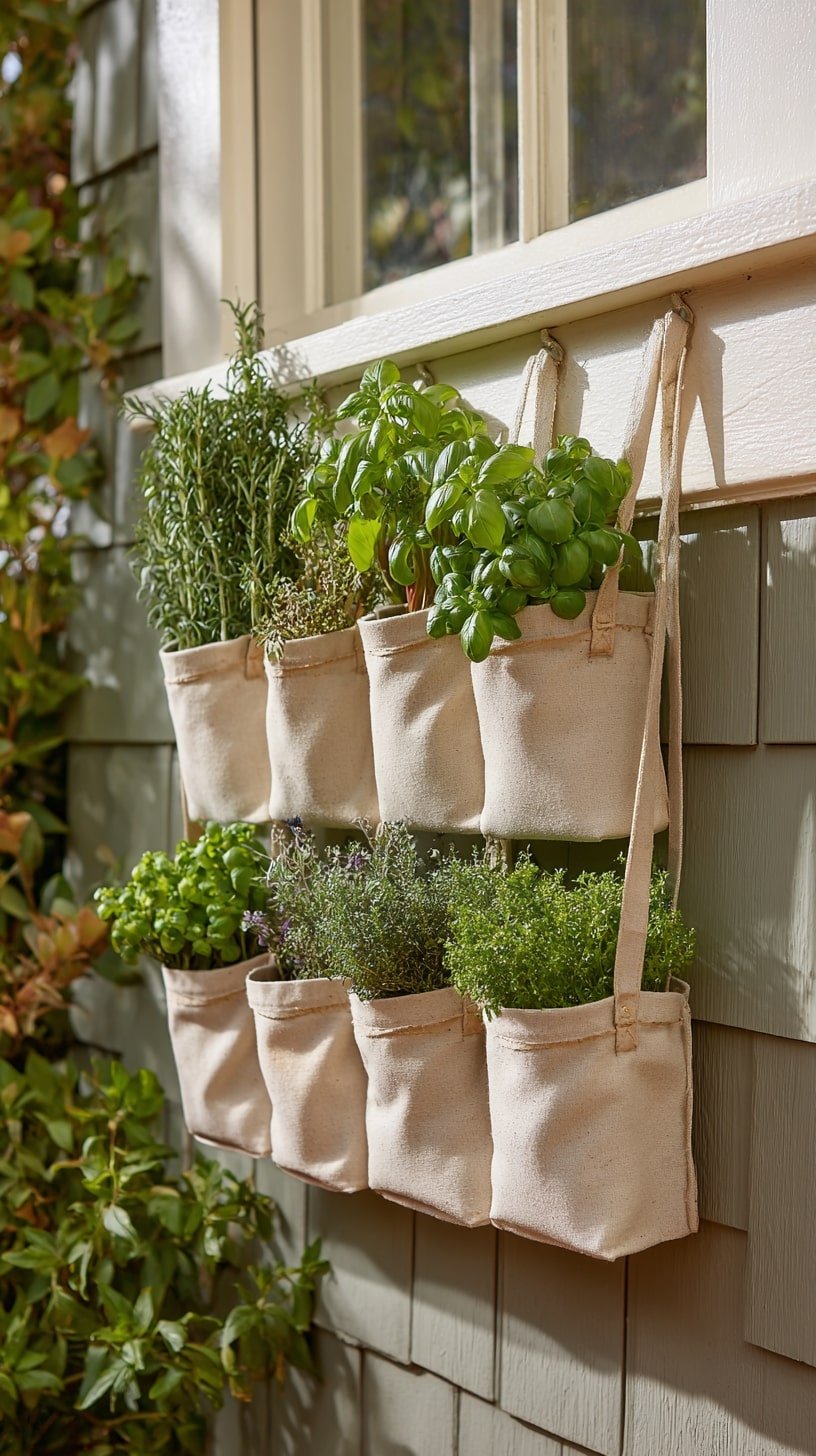
No clutter. No bulk. Just three neat rows of canvas pouches, clipped to a ledge with simple straps and sun on their backs. Herbs stand tall,rosemary, basil, thyme,each in its own pocket with room to breathe. Neutral tones blend into siding, letting foliage do the talking.
11.Match Grow Bag Colors to Walls for a Bold, Unified Plant Display
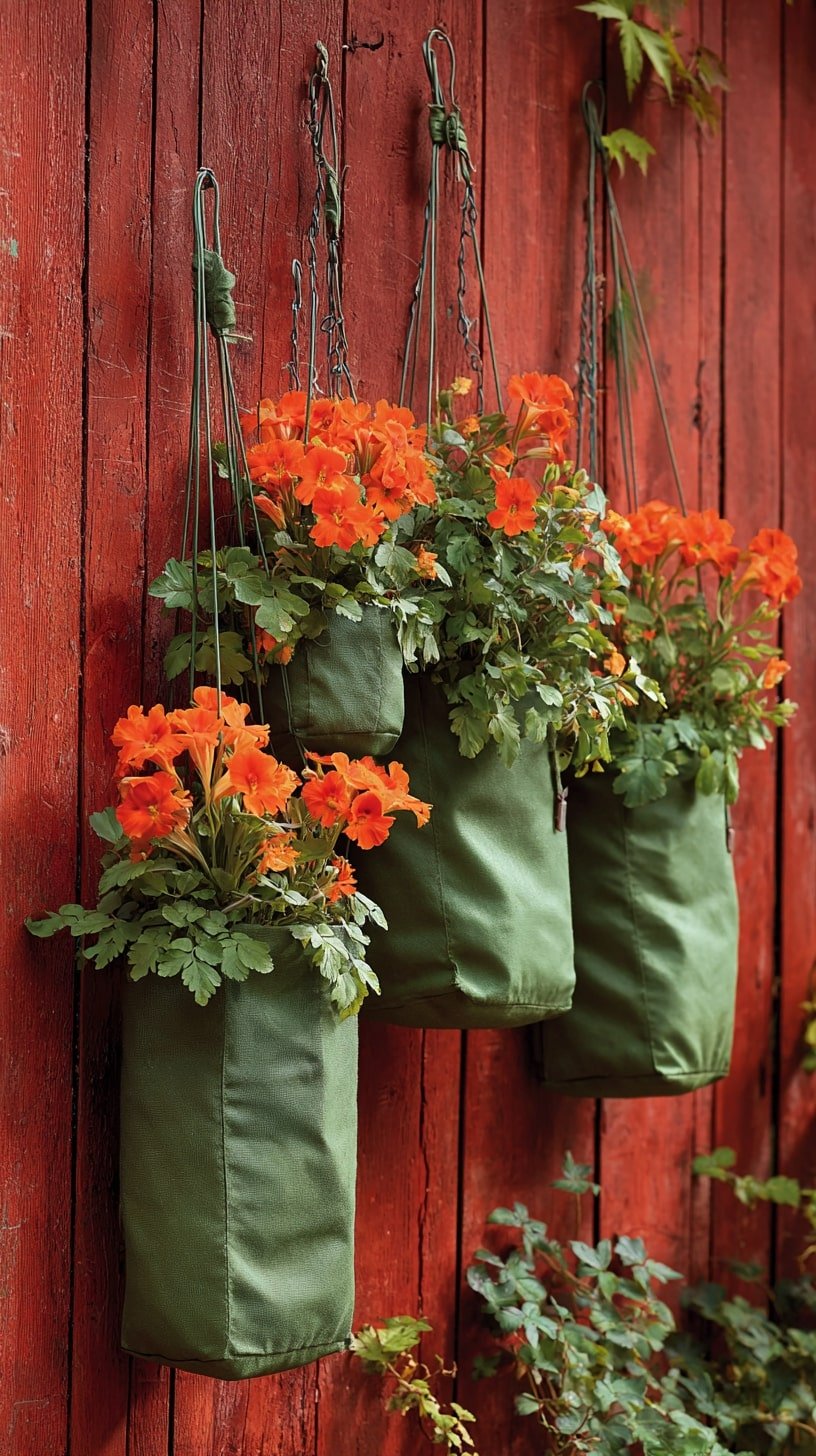
Green-on-red works. Forest-toned grow bags nearly vanish into their task, letting the flame-orange blooms explode against the weathered barn siding.
Anchored in chain and fabric, each bag feels intentional, not improvised.
Swap flowers for edible calendula, nasturtium, or scarlet runner beans. Same color, more function. This layout proves utility and bold aesthetics don’t have to fight. They can amplify each other. Clean, contained, punchy.
12.Grid Your Wall with Modular Herb Racks for Streamlined Harvesting
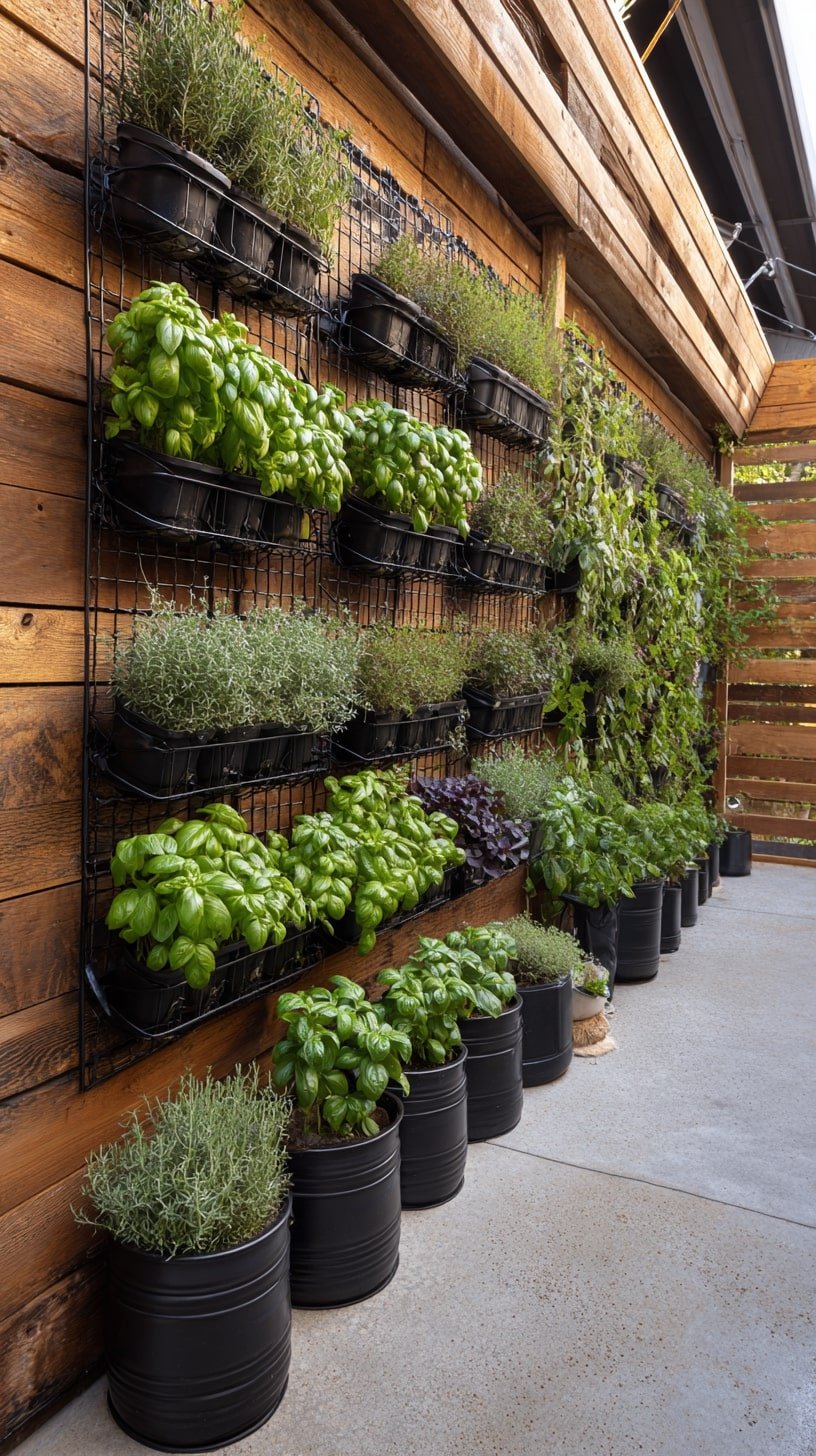
Form follows flavor here. Black wire panels lock in uniform pots, lining the wood wall like kitchen shelving. Basil pops. Thyme softens. Lavender adds lift. Everything’s visible, reachable, clean. Repetition becomes rhythm. Vertical planting multiplies space without visual clutter.
Barrels below echo the wall’s grid,same color, same scale. It feels methodical but lush. Like a pantry that grows. Ideal for tight courtyards or structured patios. Just water, snip, repeat.
13.Grow Peppers in Burlap Sacks for Rustic Heat and Texture
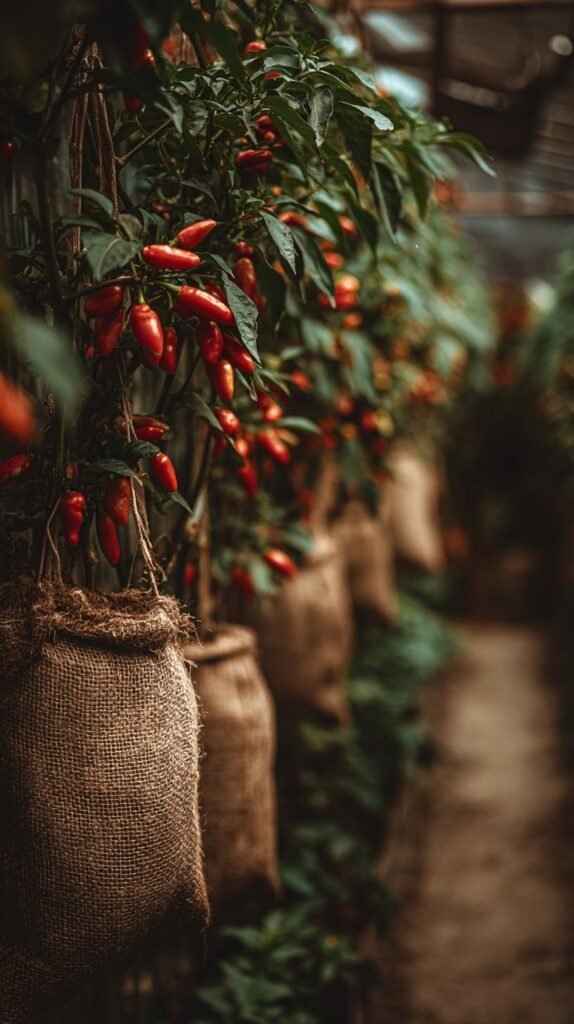
Weighty sacks. Fiery fruit. This setup leans into old-world texture with thick burlap bags strung low under ripe pepper plants.
Color contrast is strong, deep green leaves, glossy reds, coarse brown cloth. Natural materials breathe well, drain slowly, and look good doing it.
Spacing stays tight, yet each plant has presence. Nothing feels jammed. It’s spicy, rugged, efficient. Like farm meets corridor. Great for long side yards, greenhouse aisles, or walls needing visual heat and edible impact.
14.Line Patio Walls with Vertical Lettuce Planters for Fresh Picks
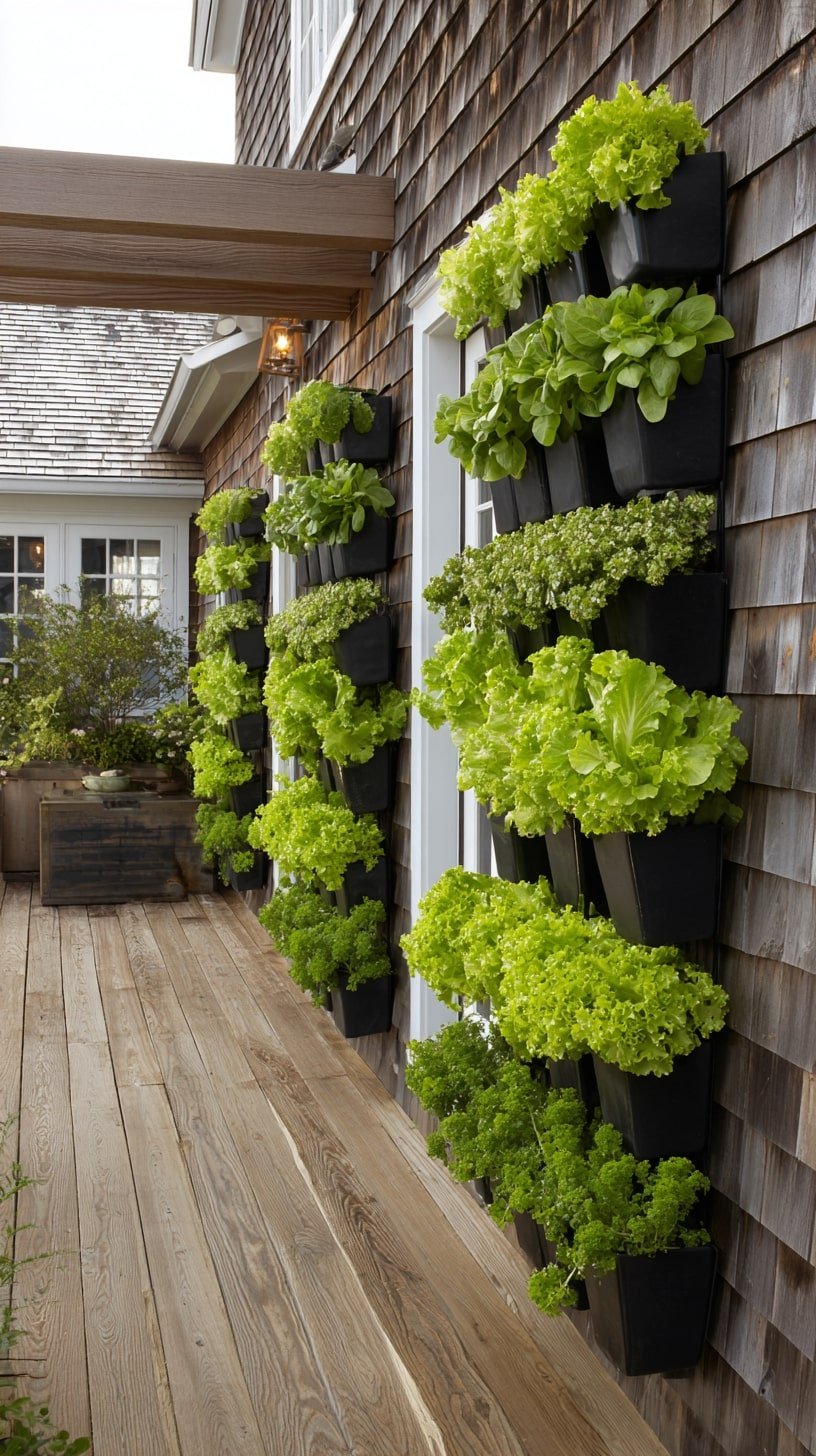
Clean rows. Crisp color. Here, black angled wall planters turn siding into salad production. The layout is rhythmic, tightly stacked but airy. Bright greens soften the wood shingles and draw the eye upward.
Lettuces thrive in this upright format,easy to cut, quick to regrow. Great drainage, no soggy roots. Plus, that proximity to the kitchen? Total win. Fresh harvest, steps away.
15.Stack Herbs in Wire Cradles for a Wall-Saving Grow Zone
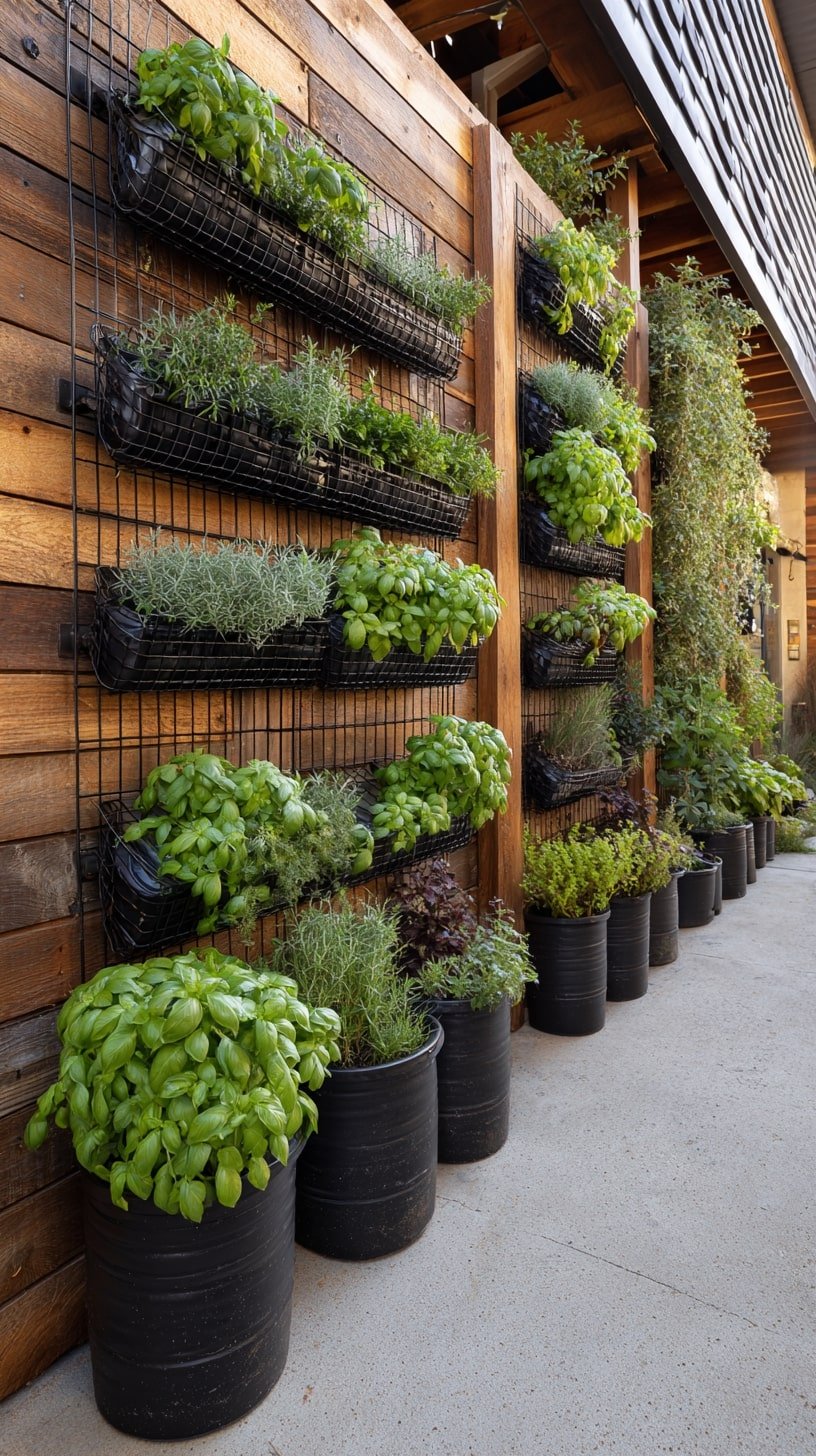
Simple trick. Mount wire baskets against wood siding and tuck in black nursery pots. Keeps things structured but breathable.
Plant choices lean culinary,basil, thyme, rosemary,easy access, fast regrowth. The black-on-brown contrast is bold but earthy.
Plus, the mix of vertical and ground-level barrels adds movement. Your patio stays tidy, but smells amazing. No clutter, all flavor.
16.Stack Grow Bags for a Tower of Strawberries
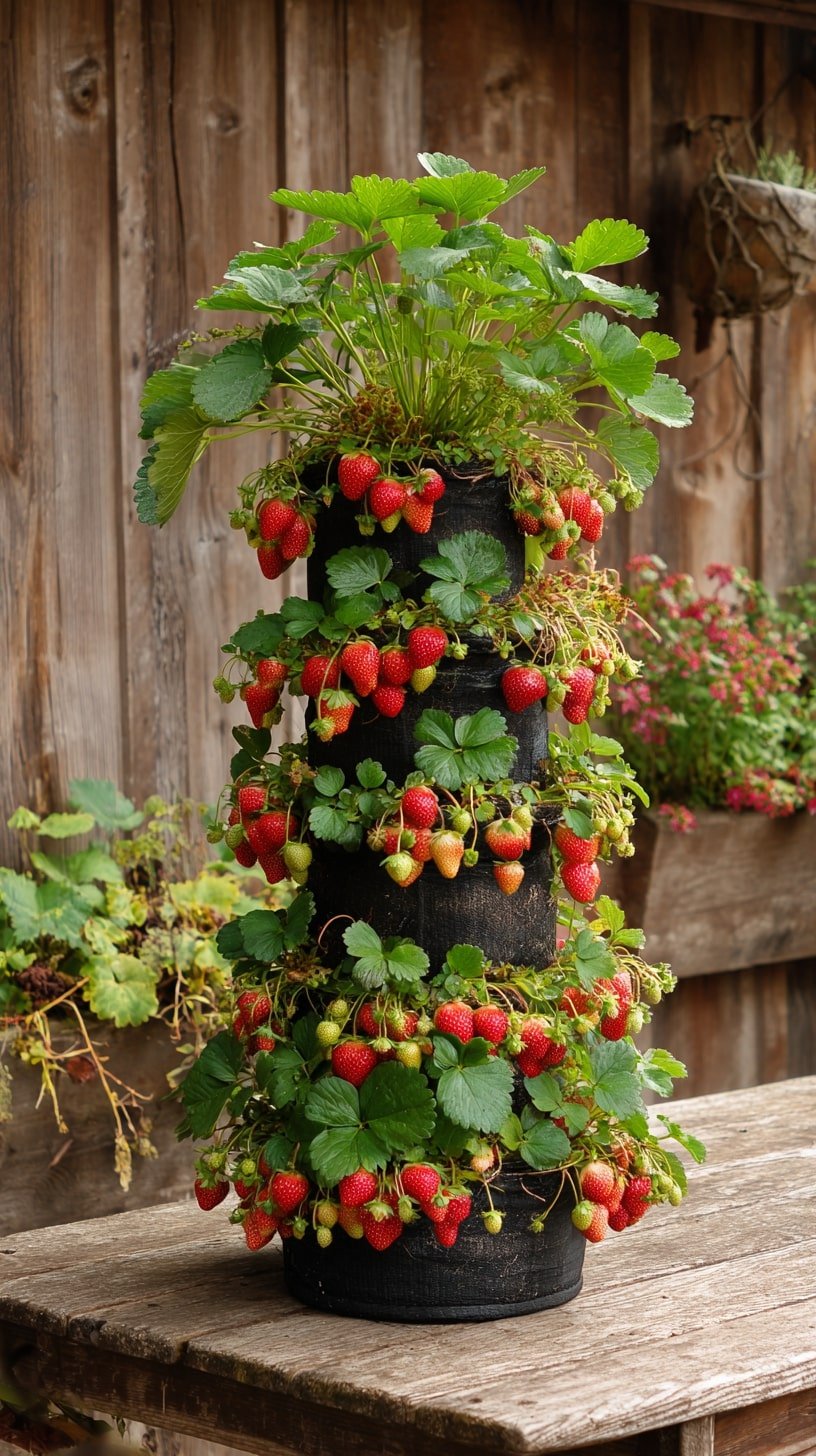
Go vertical. Five grow bags form a tidy column that turns any sunny corner into a berry-packed focal point.
Each tier’s side slit offers spillover for cascading fruit, while the black fabric boosts root warmth and drainage. Berries hang clean, easy to harvest, never buried in soil. Looks lush. Feeds generously. Small footprint, big return.
17.Mount Grow Bags to Turn a Fence into a Tomato Wall
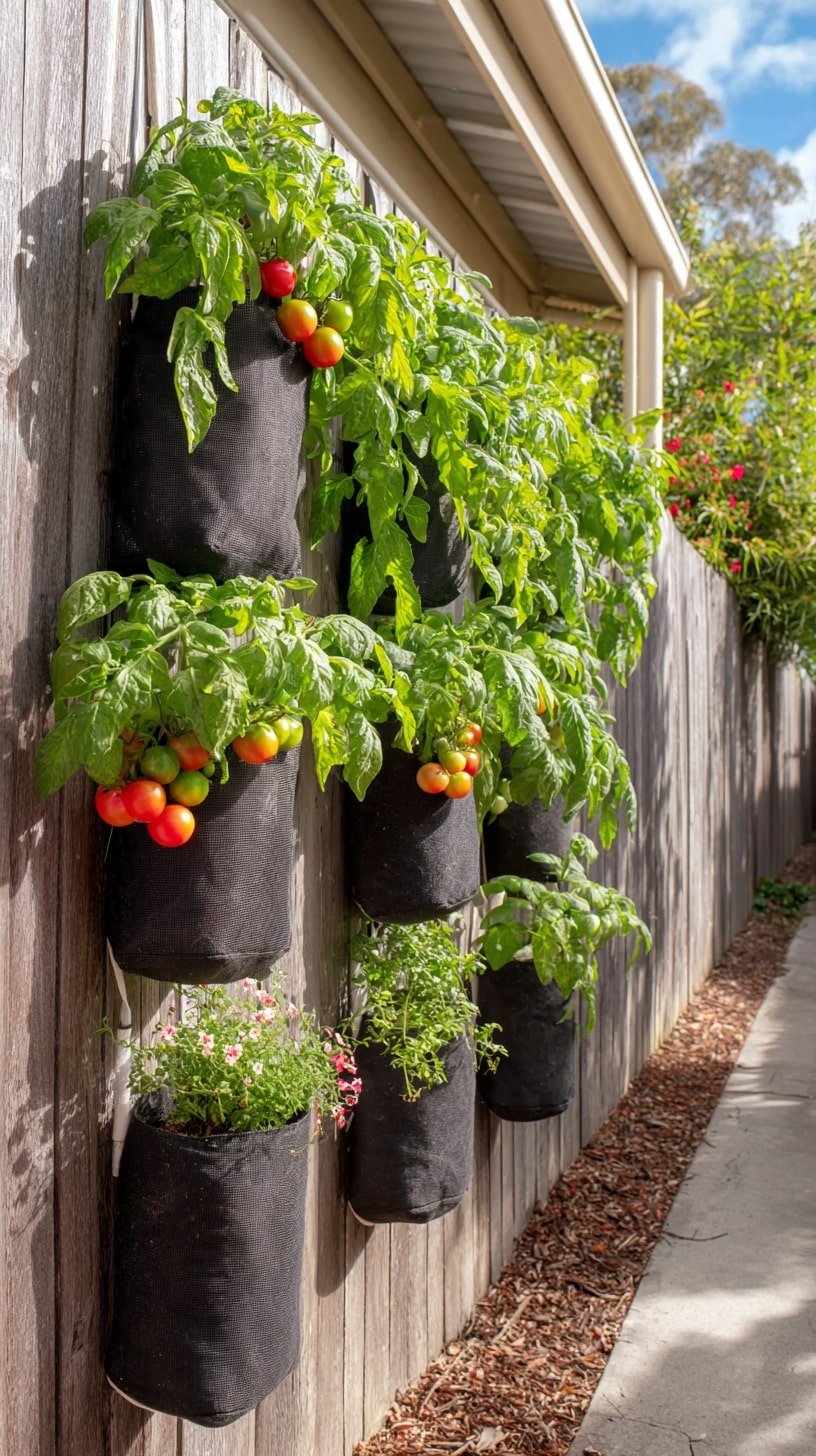
Fence becomes farm. Soft grow bags cling to vertical planks, giving cherry tomatoes height, sun, and airflow.
Top bags drip onto lower ones, conserving moisture. Leaves spill downward, fruit tucks beneath,safe from soil rot. Rich contrast too, with dark fabric popping against silvery wood. Functional.
Compact. Surprisingly productive for such a slim footprint.
18.Sling Climbing Beans with Soft Cotton Hammocks
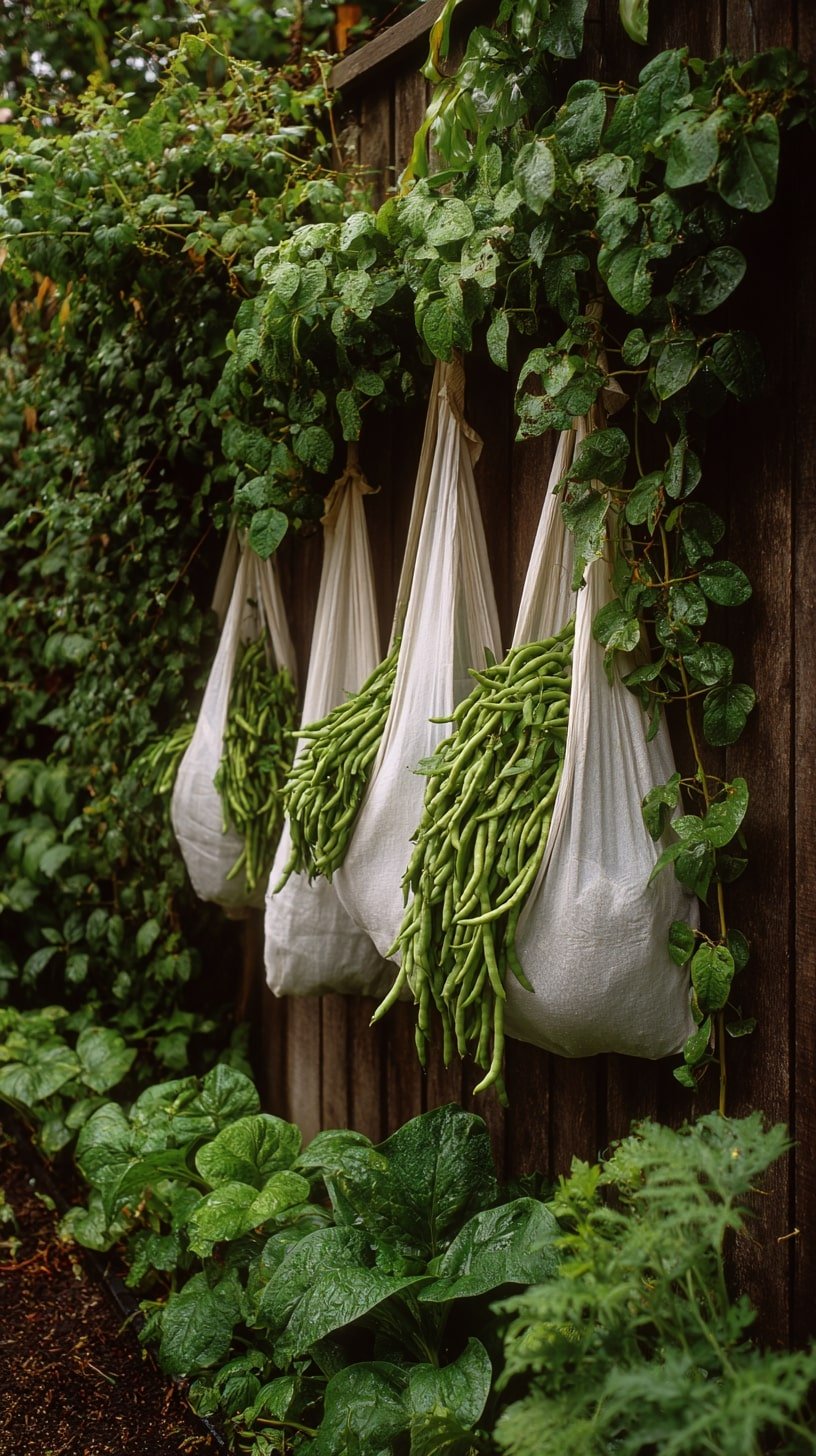
Unexpected but clever. Lightweight cloth sacks cradle tender vines, holding beans off damp ground while letting air move freely. No wood. No wire. Just gentle tension and gravity.
Visually soft too. Pale cotton pops against dark boards, while loose foliage adds drape and motion.
Works like a trellis, acts like a basket. A low-tech win for shady corners or rustic edges.
19.Mount Plastic Pots onto Pallet Slats for a Rustic Grow Wall
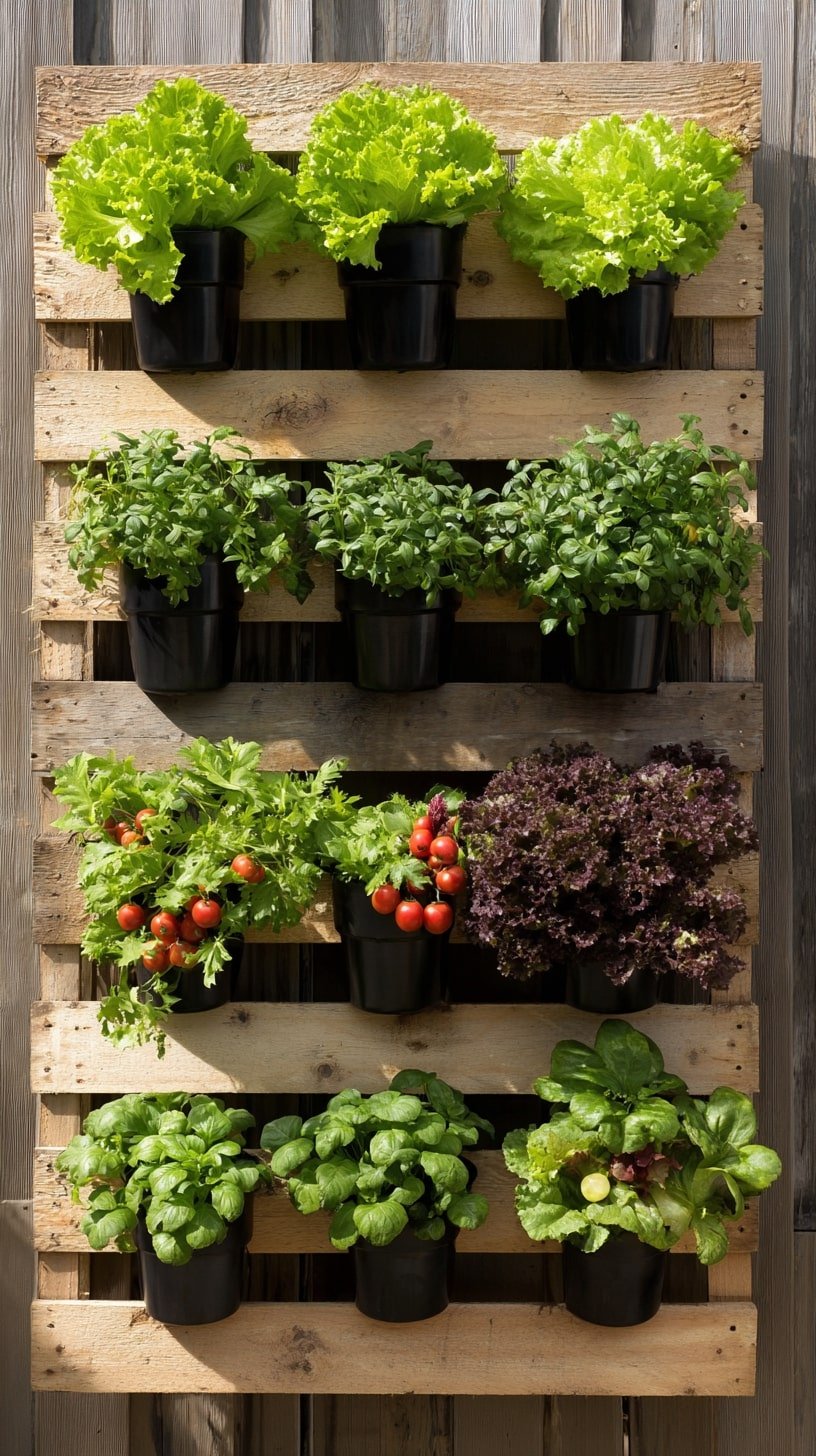
Simple idea, big return. A reclaimed pallet turns into a vertical grid for herbs and greens, no drilling needed. Gaps between slats cradle lightweight pots while offering just enough airflow to prevent mildew.
Materials contrast perfectly. Bright lettuce and red cherry tomatoes pop against matte black containers and raw wood grain.
Unfinished edges keep it relaxed. Unfussy, productive, and charmingly handmade.
20.Train Cucumbers Up a Netted Canopy for Lush Vertical Yield
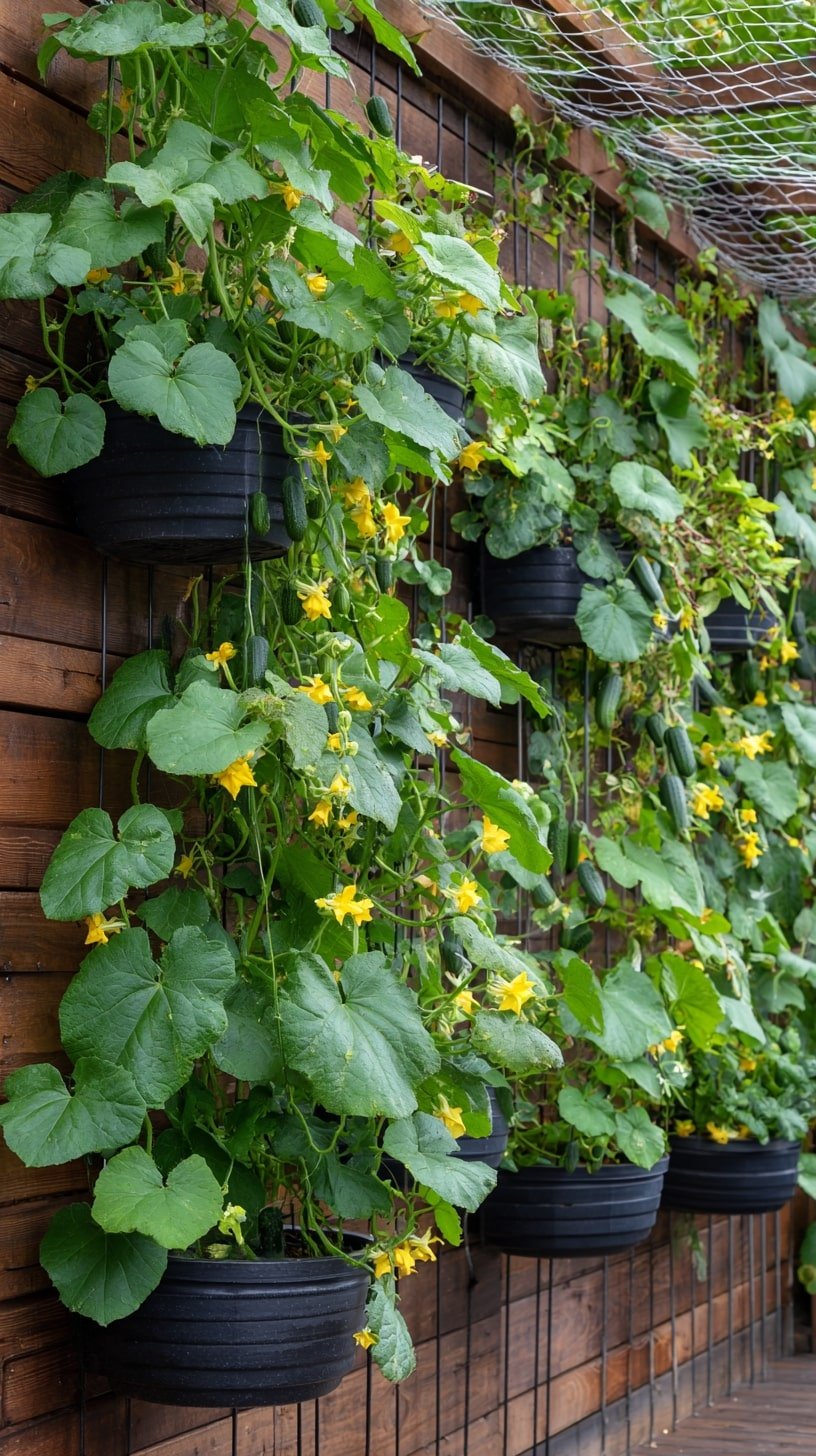
Wall meets canopy. Hanging planters fill with trailing cucumbers, then climb upward into a netted roof,part garden, part green tunnel. It’s immersive. Efficient too.
Netting guides vines upward, reducing rot and boosting airflow. Dense foliage shades lower pots, helping with moisture control.
Black grow bags blend into the wood, letting all that vibrant green take center stage. Just pure abundance.
